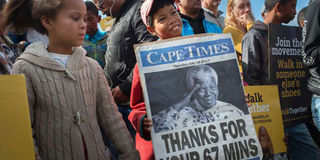Lessons from Mandela for the spoilt, selfish African leaders

A young boy holds a poster with a photo of former South African President during Mandela Day on July 18, 2017 in Cape Town. To Nelson, making friends with the people who had kept him in jail for nearly 30 years came naturally. PHOTO | RODGER BOSCH | AFP
What you need to know:
- Nelson would not live in bondage and he would not have other people living in bondage.
- Finally, Nelson deeply cared about people; not just black people but people of all colour, and all walks of life.
I really like Nelson Mandela, whose 99th birthday was marked three days ago.
He belongs to a pantheon of mine, whose other members are my grandfather, who didn’t do much but taught me stuff about being an African tribesman, which is important, and my father, who actually did fight in a war.
PURPOSE
I never met Nelson, though I probably could have. But I never felt the need to.
I feel I have known Nelson all my life; at least I know what he lived and died for.
I also know how different he was from the average African leader.
COMMUNICATOR
And I still feel, as I did growing up on this continent, what an affront it was for the apartheid government to jail a man many consider not just the leader of South African blacks, but also of all the blacks on this and other continents.
Nelson was so great because he was a charming, clever man, but also because he was such an effective communicator.
TOUBLEMAKER
He grew up in a royal house, studying the behaviour of a ruler who was himself tutored in the behaviour of other great Thembu chiefs and possessed the accumulated wisdom of many centuries of how to treat his compatriots, how to win respect and loyalty and how to be a champion of the people.
Nelson was a man of delightfully many parts.
Even his own name, Rolihlahla (pronounced with a series of explosive Xhosa clicks, I suppose) was an accurate description of the man (“troublemaker”).
STATESMAN
He had a royal heritage, but had been born into the Ixhiba lineage, the side that never ruled but was destined to advise, as counsellors, the rulers.
But he did go on to rule, not just the Madiba clan and his tribe, but the whole of South Africa, Africa, and, indeed, the world.
We in Africa have never seen such a man.
For a man who dominated the world for decades, he was simply known as Nelson Mandela.
ROYALTY
But he had many other names, too.
When he joined the royal house, after the death of his mother, his adoptive family called him “Tatomkhulu” or grandfather, on account of his serious, gravelly manner and because he looked a little like an old man.
On circumcision, he was given a new name, Dalibunga, meaning something like the man who forms the high council that rules the tribe.
LIKEABLE
At age seven, “Troublemaker” went to missionary school resplendent in his father’s trousers, the legs hacked off at the knees, and the generous waist gathered with a string.
The good humour with which he describes some of these humble parts of his story are what make Long Walk to Freedom one of the best reads ever and Nelson himself such an engaging and likeable fellow.
MANHOOD
The reason I raised the circumcision angle is because I wanted to reproduce the speech, as Nelson recalled it, of Chief Meligqili when he addressed the new initiates, among them the future President of a democratic South Africa.
He said: “There sit our sons; young, healthy and handsome, the flower of the Xhosa tribe, the pride of our nation.
"We have just circumcised them in a ritual that promises them manhood, but I am here to tell you that is an empty, illusory promise that can never be fulfilled.
"For we, Xhosas, and all black South Africans, are a conquered people. We are slaves in our own country.
"We are tenants in our soil. We have no strength, no power, no control over our own destiny in the land of our birth.”
FREEDOM
If there ever was a reason to fight, I doubt anyone could have put it better.
And what made Nelson such a great, revolutionary leader?
It was his love of freedom. Nelson would not live in bondage and he would not have other people living in bondage.
INJUSTICE
Like Gadla Mandela, his father, Nelson, too, was a very brave, very stubborn and very rebellious man when faced with injustice.
They kept him in prison for 27 years and it never changed his mind.
Even though he was missing out on life with Winnie, who was young and pretty and full of life, and their young children.
INTEGRITY
Even though the apartheid state would have showered him with bribes to betray the cause, Nelson’s integrity was a mile high.
Finally, Nelson deeply cared about people; not just black people but people of all colour, and all walks of life.
The purpose of the revolution was not to exact revenge on the folks who had oppressed him and his people but to create a state where all people could live in peace and friendship.
LOVE
To Nelson, making friends with the people who had kept him in jail for nearly 30 years came naturally.
That was why Nelson walked tall, well above Africa’s petulant and spoilt ruling classes, which demand livelihood and power from the people and threaten to burn countries if they don’t get it.
Happy birthday, Nelson wherever you are in heaven. And thanks for everything!





